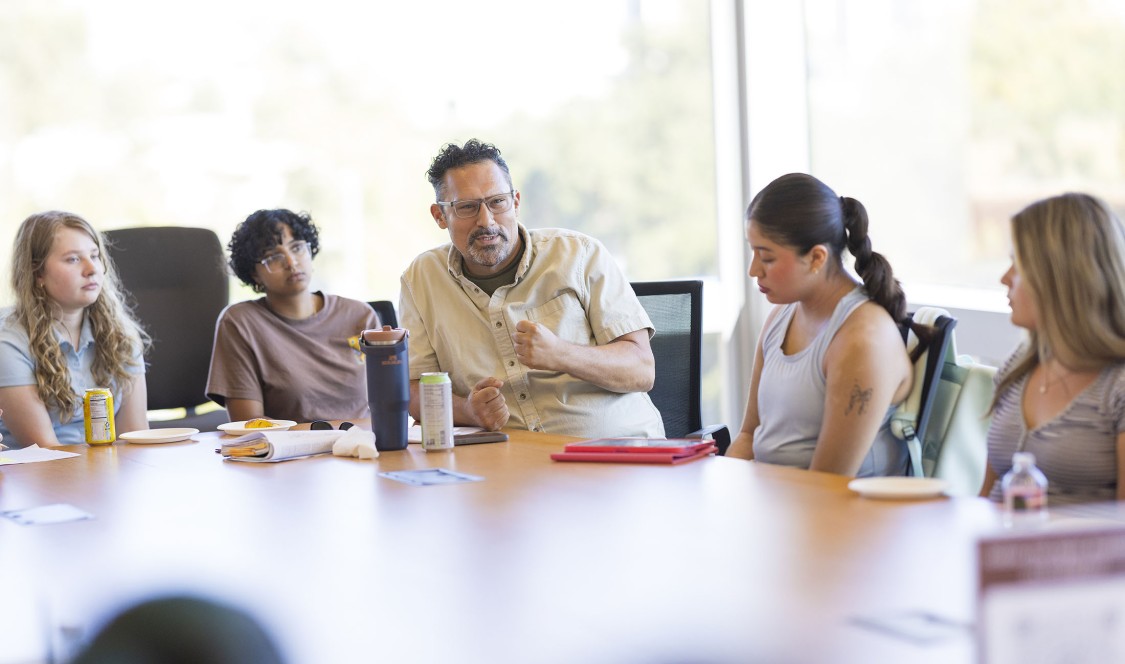On the same day Professor Nicholas Buccola’s book, One Man’s Freedom: Goldwater, King, and the Struggle over an American Ideal published, Buccola spoke at CMC’s Marian Miner Cook Athenaeum, detailing how he came to explore an “important period in political history.”
Buccola began by offering a brief background into how, from 1955-1964, Arizona Senator and former GOP presidential candidate, Barry Goldwater, and civil rights trailblazer Martin Luther King Jr. “emerged as the leaders of two diametrically opposed freedom movements that changed the course of American history—and still divide American politics.”
The Dr. Jules K. Whitehill Professor of Humanism & Ethics and Government Professor at CMC, Buccola specializes in American political thought. As in his widely acclaimed 2019 book, The Fire Is upon Us: James Baldwin, William F. Buckley Jr., and the Debate over Race in America, Buccola took a “part dual biography, part history” approach to tell the story of Goldwater and King, who—like Baldwin and Buckley—held disparate views. Buccola said he conceived One Man’s Freedom as a possible volume two in a trilogy focused on the clash between the conservative and civil rights movements.
Goldwater and King were openly antagonistic toward each other and, Buccola noted, unlike Baldwin and Buckley, the pair never debated in person, nor did they ever meet. “One of the puzzles that this book tries to answer is, why did these two sides view each other with such suspicion?” Buccola said.

“Both King and Goldwater think of themselves as leaders of freedom movements. They think of themselves as trying to figure out a way to make this a free society, and yet they view each other with mutual suspicion and even a kind of hostility. So, one of the questions at the heart of this book is, why? And what can we learn about ourselves from the story of Goldwater and King?”
Buccola continued that one of the lessons Americans can learn from examining the lives of Goldwater and King centers on freedom as a concept. “We take these two individuals, as not just leaders, and what they said and did, but also as symbols of movements, who are out there preaching their gospels of freedom.” And, further, “What do they imagine human beings’ freedom to be? What do they view as the greatest threats to that freedom?”
In the audience for the Oct. 7 talk were CMC students and colleagues actively engaging in a dialogue across difference, which seemed to fit the evening’s theme. And discussions initiated in the classroom had the chance to continue, such as from “Liberalism and Conservatism,” the Gov 192 course Buccola is co-teaching this semester with Professor Charles Kesler, Dengler-Dykema Distinguished Professor of Government.
The course “examines the character of the political opinions calling themselves liberalism and conservatism,” … with attention “paid to the variety of doctrines within each school of thought, and to what unites as well as divides the politics of liberalism and conservatism as a whole.”
Buccola has said that, “Central to what we do at CMC is thinking about ethics, thinking about leadership, and dialogue across difference.” To this end, he frequently takes part in campus events, such as the academic year’s first Saturday salon, “Unfinished Promise of the Declaration,” hosted by The Open Academy, to “discuss the gap between America’s founding ideals and lived reality.”
During the Q&A at the end of the Ath talk, Asia Best ’27 addressed Buccola: “My perspective is that Goldwater was against King’s new movement, as it utilized the state, or possibly national government, as an instrument for popular sovereignty or generating economic security. I’m thinking of his Poor People’s Campaign, for example. I also see that Goldwater’s culture of freedom as a desire to limit state control. How do we understand existing movements, or reconcile with movements, both on the right and the left, that essentially want to tip the scales towards equality or fairness in one direction or the other, privileging certain groups seemingly over the other?”
Buccola answered: “This is a really important question that comes up in a lot of different ways in the book, trying to figure out what we mean by ‘big government’?”
He continued: “King said, every law has a kind of morality in it. We are communicating something about our values as a society with every law that we pass. And Goldwater would say things like, ‘Well, we can’t legislate morality. We can’t tell people they ought to love each other.’ But King said, ‘The law can’t make you love, but it can stop people from lynching. The law can’t make you happy that I’m entering your place of business. But if you’re open to the public, you’re open to the public, then you ought to serve me just like anybody else.’”

